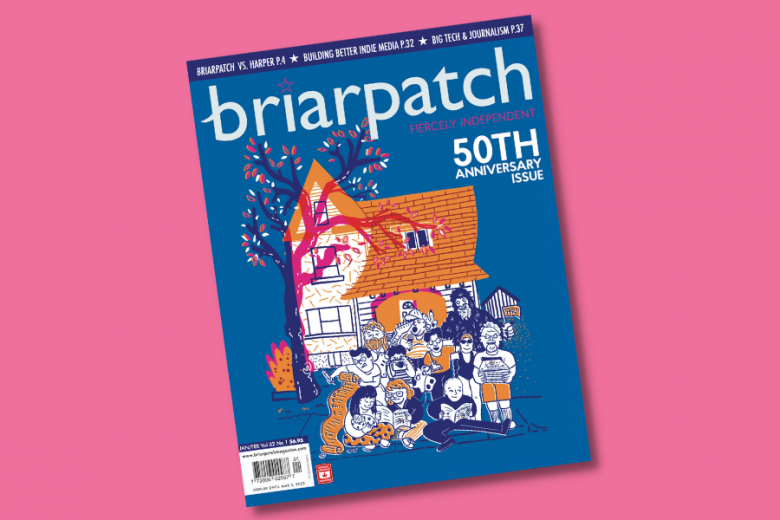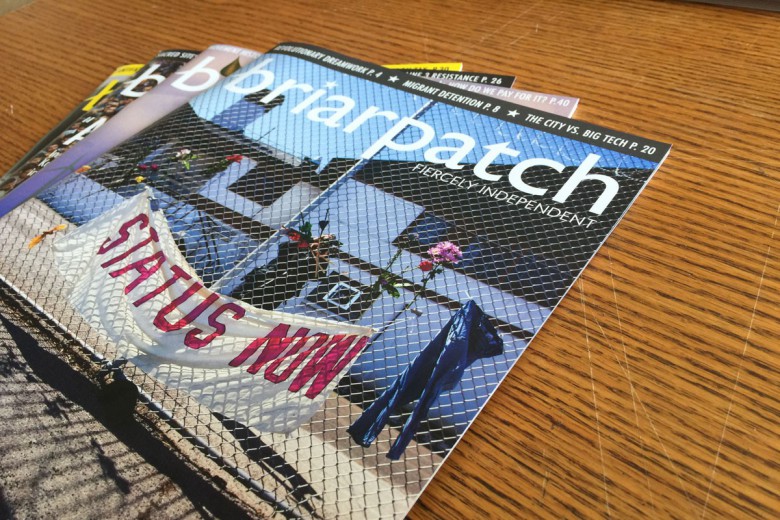Yes, letter from the publisher. Hi! Our readers don’t hear from me a lot (though, if you’re a subscriber or a Sustainer, I hope you hear from me exactly as often as you’d like). That’s for a reason. As a publisher, I mostly work behind the scenes to ensure that the magazine’s editor can focus on what our readers really want: the incisive, fiery reporting and analysis that goes into every issue of Briarpatch.
Whether we’re exploring new journalistic territory or intervening with a fresh and vital broadside against a mainstream narrative established to benefit those in power, my job is making sure Briarpatch has the resources it needs to make our work possible, and ensuring that as many people as possible read the work once it’s out there.
Fresh from meeting a good number of readers and fellow travellers in the Canadian lefty media sphere at the Montreal Anarchist Bookfair this past May, I’ve been thinking a lot about what’s made Briarpatch so durable over the last several decades. At least part of it, I think, comes down to our relationship with our readers.
We try to publish stories that aren’t just informative but actually useful. Whether it’s mapping out pathways to successful organizing or simply examining a point of struggle, we strive to produce material that actively benefits organizers, activists, and community members. In turn, the majority of our funding comes from our readers, who value our work and directly enable our efforts to produce more of it.
The support of our readers gives us the editorial freedom to produce a magazine that proudly and defiantly bucks the status quo in favour of envisioning a more equitable, more just, more radical future. Here in the tumultuous media environment of the 2020s, where private equity firms and Silicon Valley strong-arming have been the proverbial rock and hard place for mainstream publications (and an unfortunate number of our independent peers), Briarpatch has managed to remain stable by focusing on what we do best: radical journalism with quality and integrity, straight from the front lines of movements.
At every turn, I try to remind our readers that they get to take credit for this. You – yes, you! – are the reason this beautiful little magazine gets to be so scrappy, pugnacious, and uncompromising. It’s a point of pride for me as a Regina townie that a hometown magazine has such an incredible legacy of ferociously principled journalism taking on ground-level stories across so-called Canada, and the last few years for me have been a wonderful education in the kind of community that produces something like Briarpatch. And this issue is full of the kinds of stories that looped me into Briarpatch as a much younger reader – demonstrations of why being an independent, reader-funded publication matters.
Chris Ramsaroop’s story links Canada’s role in driving the climate crisis to its expansion of temporary foreign worker programs to show how Canada is profiting off displaced people as they flee for their lives – a much-needed grounding of a couple of sprawling topics in their real, human costs. Lydia Dobson’s article asks an important question – “Who is a prisoner?” – that our current carceral system is ill-equipped to answer in a humane way, and maps the system to help organizers dismantle it. And our cover story, Jamie Brownlee and Kevin Walby’s look at the corporatization and commodification of psychedelics, is extraordinarily timely, as grey market saturation has begun to push the legalization vs. decriminalization debate on psychedelics into the mainstream.
These stories, which all challenge dominant narratives and present real alternatives to our present political reality, are all the richer for being the kind of journalism that we can only produce thanks to the generosity of our readers – I don’t think my office phone is going to be ringing off the hook with psilocybin startups looking to book ads once this issue hits stands, for example. So, once again, here I am doing one of the best parts of my job: thanking you for making this issue of the magazine possible. We’ll do what we can to keep earning that support, for as long as it takes us to bring into being the better world we’re all fighting for.


_1200_675_90_s_c1_.jpg)




